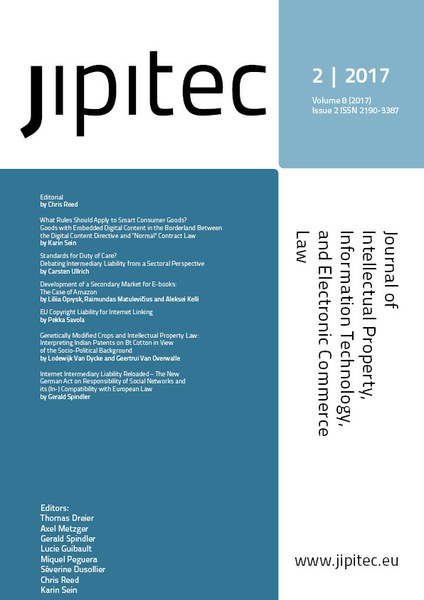Standards for Duty of Care? Debating Intermediary Liability from a Sectoral Perspective
Keywords:
Intermediary liability, reasonable duties of care, regulation, sectoral approach, self-regulationAbstract
The EU’s current regulatory framework for the content liability of online intermediaries was created in 2000 with the E-Commerce Directive (ECD). Already in those days, during the run-up to the ECD, there was an intense debate regarding whether a light-touch approach or more stringent content liability regime for intermediaries would be the appropriate way forward. 20 years later the debate is essentially led from the same angle, but has predictably, increased in complexity as the internet makes massive strides in transforming the “offline” world. There are those who argue that a purely horizontal approach in regulating internet intermediaries, or online platforms, remains sufficient. Others think the time has come to reflect the disruptive entrances online platforms made in various sectors of society in more vertical changes affecting substantive law. The EU Commission sits on the fence it seems, however. In its communication on online platforms and the digital single market, the Commission announced last year that it would leave the current intermediary liability regime as it is for now “while implementing a sectoral, problem-driven approach to regulation”. This paper will map out and critically evaluate some current sectoral (read vertical) regulatory developments, which may affect intermediary liability. It will look at recent, more top-down approaches proposed by the EU (e.g. in copyright), as well as self-regulatory efforts. This will be compared to less publicized developments, which have notably taken place in the area of product and financial regulation affecting ecommerce, such as for example efforts to combat the sale of fake medicines, unsafe products online, or anti-money laundering compliance. In these areas, it is argued that regulatory authorities have more proactively engaged online platforms, both on a legislative and practical level. A special focus in this context will be on the role of reasonable duties of care which intermediaries may be required to apply in order to detect and prevent infringements. Could these more “grassroots” developments and the convergence of online and offline worlds provide blueprints to encourage the development of a new content liability framework based on sectoral duties of care?Published
2017-09-13
Issue
Section
Artikel

